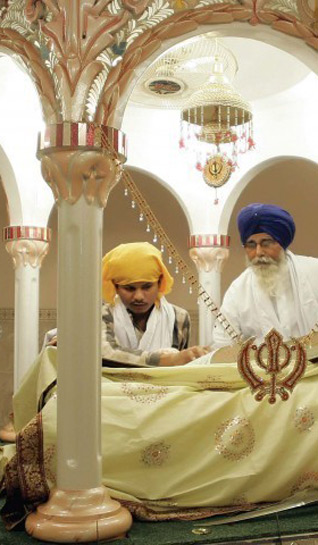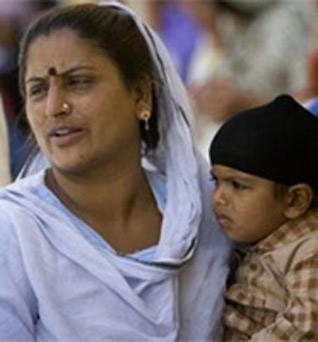Travel
Sikhs Of Sindh
NARGIS KHANUM
My professional pride took a fall recently when I read in a morning newspaper that there were Sikh citizens of Sindh. I was ignorant of this fact.
I have travelled all over Sindh, been to remote villages, obscure towns and well known cities except in Nagarparkar. I have never met a Sikh. Now I learn there are 20,000 Sikhs in Sindh.
I am not ignorant about Sikh citizens of Pakistan, but I believed they lived only in the lands once ruled by Maharaja Ranjit Singh. I knew of their presence in Swat, Buner, Peshawar and, of course, the Punjab.
In the Lahore Fort Museum artifacts from the time of Maharaja Ranjit Singh draw a large crowd of spectators. In the basement is a handsome taxidermied white horse which belonged to the Sikh ruler. Whenever I visit the museum, which is every time I go to Lahore -- I love this museum -- I go down to see the artifacts and have always found the largest crowd of spectators near the horse. The guide keeps repeating 'Yeh Ranjit Singh ki ghorri hai' (This is Ranjit Singh's mare).
In the large area of Karachi, called Gurumandir, there used to be a small gurdwara, which I was told was dedicated to the Sikh Gurus and from it the area was called Gurumandir. That is my only info about Sikh presence in Sindh.
Today I cannot find the gurdwara nor, I am ashamed to say, do I know any Sikhs of Sindh.
In an interview to the morning newspaper, Pakistan Sikh Council patron-in-chief Sardar Ramesh Singh recently declared the Sikh community would boycott the upcoming local bodies elections. He also complained about the lack of Sikh representation in the national and provincial assemblies, but his main complaint was about the way elections are held at the local level.
Here, once again, we are confronted by the chronic minority issue. While on the one hand, it is a shame that any citizen of Pakistan should be labelled a minority-member and therefore denied the same rights in the general and local bodies elections; on the other hand, the so-called minorities demand reserved seats in the national, provincial and local bodies but also the right to vote in the mainstream. Some critics term it a 'dual-voting right'.
The demand is not as odd as it sounds, because on the one hand, politicians have largely ignored the demands of non-Muslim voters and, on the other hand, the so-called minorities feel they are sidelined if not allowed to vote as full-fledged citizens of the country.
There are Parsis, Sikhs, Christians, Hindus and other non-Muslim communities, such as Bahais and Buddhists. According to Sardar Ramesh Singh, politicians in Sindh only favour Christians and Hindus of Sindh. Not just that, but the Christians and Hindus, even when they are elected on the seats reserved for minorities ignore others, like the Sikhs.
According to the Sardar, during the previous tenure of PML-N from 1997-99, the Parsis and Sikhs were seen as one separate group among the minorities and used to have one reserved seat in the National Assembly and one each in the four provincial assemblies. This special treatment is understandable because as communities the Parsis and Sikhs are economically and socially better off than the other minorities (perhaps one should also except the Bahais). It makes sense that they should also have reserved seats in the local bodies.
How can we claim Pakistan is a democratic country if so many of her citizens are treated like second-class people, ignored not just by politicians but actually by all of us. But nobody seems to suffer from a guilty conscience.
The USA has many people of different religious communities but those in power are mainly White Anglo Saxon Protestants (WASPs). Even the Blacks are Christians. But in all other respects the citizens have equal rights whether they are Christians, Jews, Sikhs, Muslims, Hindus or of any other community.
So why cannot we be like the Americans? We not only treat our non-Muslim fellows as minorities in the political sense but in every sense. We deny them equal rights. This is the reason why non-Muslim communities fail to progress.
Sindh's Tharparkar district has a strong Hindu presence. It is the most neglected district. The literacy level is the lowest. There is little access to medical aid, there is hardly enough water. If the land is irrigated it will flourish and the people prosper, but there is no plan, and never will be, it seems, to do anything to develop this district.
Finally, why is it that minorities have to voice their own plight? They often trek all the way to Karachi to seek their rights but get only sweet talk and promises, which never materialise.
[Courtesy: Business Recorder. Edited for sikhchic.com]
October 6, 2015
Conversation about this article
1: Rup Singh (Canada), October 07, 2015, 4:31 PM.
Minorities, no matter who or where, have been and will continue to be mistreated by the majority, usually without any rhyme or reason. The author uses the USA as an example where everyone has equal rights. I disagree, observing that Sikhs have had to go to court to win the right to join the police and armed forces. Even a Rabbi wasn't allowed to serve because of his beard, he went to court and won his right to serve. These cases were fought just 5-6 years ago, in some jurisdictions even now. Also, we cannot overlook the historical and current mistreatment of aboriginal people in the USA. Up to the 1960's and 70s, Blacks were made to sit in the back of the bus, had different water fountains in parks to drink from, were not allowed in restaurants. Blacks will do more jail time than a white man convicted for the same crime. The USA is not a good role model.
2: Bambra (Delhi, India), October 09, 2015, 1:15 PM.
Today the divide is between the haves and the have-nots. Nothing has changed except discrimination returning in ever new garbs. There are sections within the community which stand on a pedestal and trod fellow brethren and this is not limited, it is exercised silently and effectively by humans against humans.




